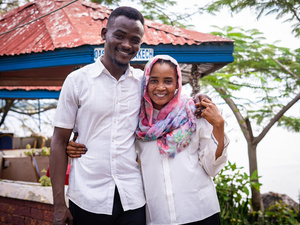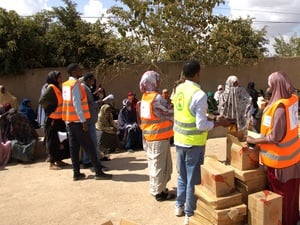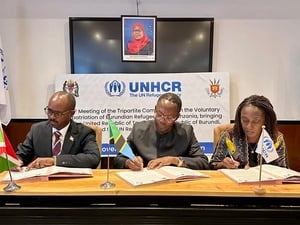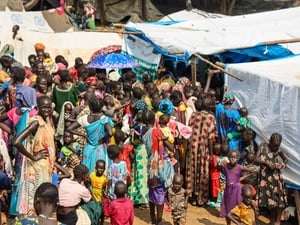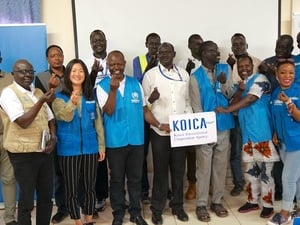Sudan requires a huge response as needs mount and rains loom
Sudan requires a huge response as needs mount and rains loom

Returning South Sudanese refugee Achan stands with her six children in the bush near a UNHCR transit centre in Renk, South Sudan.
GENEVA – As violence in Sudan continues for a fourth week, nearly 200,000 refugees and returnees have been forced to flee the country, with more crossing borders daily seeking safety. Additionally, hundreds of thousands have been internally displaced with many more confined to their homes, unable to access necessities.
The humanitarian response is challenging and costly, as refugees and returnees are arriving in remote border areas where services and infrastructure are scarce or non-existent and the host population was already suffering due to climate change and food scarcity. The coming rainy season will make logistics even harder as many roads will become impassable.
UNHCR, the UN Refugee Agency, has deployed teams and, with partners, has rushed to deliver aid from the onset of the emergency using flexible funding from donors. A scaled-up response will require significant additional funding, however, and UN agencies and NGO partners will release further details on their requirements in the coming days.
Support from the private sector has been slow compared to other emergencies, despite the urgency and severity of the crisis for refugees and internally displaced. The situation is particularly critical because the humanitarian response in Sudan and neighboring Chad, South Sudan and Ethiopia was already significantly underfunded at the start of the fighting on 15 April – none of the UNHCR operations in these countries had funding covering more than 15 per cent of needs.
In Sudan, UNHCR teams continue delivering aid from dwindling stocks especially in the East and South, which have been less affected by fighting. Movements in-country are challenging and expensive in light of the security situation and fuel shortages, which increase transport costs. Among the displaced, it is estimated that over 83,000 refugees from other countries have moved from Khartoum and other urban areas into existing refugee camps. While registration, education and community-based protection continue there, services are stretched, and more support is needed for shelter, water and medicine. In Port Sudan, UNHCR has distributed blankets, plastic sheeting and other relief items with over 750 families receiving vital support since 7 May. In North Darfur, UNHCR distributed generators, tents, and other relief items to health facilities including a maternity hospital.
UNHCR welcomes the Declaration of Commitment to Protect the Civilians of Sudan signed yesterday, and we hope it will allow for much needed humanitarian assistance to be safely delivered and for essential services, like health care, water and electricity to be restored.
In Renk, South Sudan, relocation from the border is a priority to prevent more congestion, but transportation is limited. When the rains hit, the few roads to the border will be cut off. UNHCR has therefore established a new transit center, where new arrivals are given food, water, and accommodation in communal shelters. They also receive survival kits before moving onward. Clinics have been set up for medical screenings, emergency healthcare and referrals.
In Chad, another 30,000 refugees have been monitored arriving in recent days, bringing the total number moving from Sudan to Chad in recent weeks to 60,000. Almost 90 per cent of refugees are children and women, including many pregnant women. One-fifth of screened children between six and 59 months have been found to be acutely malnourished. Half of arrivals have family members still in Sudan wishing to join them in Chad. Some men have reportedly stayed back to guard property. Relocations from the border are due to start at the weekend. More than 3,000 refugee families have received relief items. Additional emergency relief items have been airlifted on two flights this week from UNHCR’s warehouse in Dubai.
In Central African Republic lack of fuel and poor road conditions pose challenges bringing relief items close to the border. Hygiene kits, mosquito nets, kitchen sets and shelter items are being distributed to new arrivals. In Ethiopia, communal emergency shelters have been constructed in Metema, a main arrival point. Registration and protection activities as well as hot meals are being provided by UNHCR partners. In Egypt, UNHCR and partners are delivering water, food, wheelchairs, hygiene kits and sanitary items for new arrivals at the borders through the Egyptian Red Crescent. New arrivals have approached UNHCR in Cairo for registration and support. Registration has been accelerated so refugees can swiftly access assistance like health and education.
UNHCR calls for immediate financial support for all involved in the response to avoid a humanitarian catastrophe, prevent tensions over strained resources and support those forced to flee in a dignified manner as well as the host communities that receive them.
For more information, please contact:
- In Dakar (regional), Alpha Seydi Ba, [email protected], +221 773 457 454
- In Nairobi (regional), Faith Kasina, [email protected], +254 113 427 094
- In Geneva, Olga Sarrado, [email protected], +41 797 402 307
- In Chad, Eujin Byun, [email protected], +235 61 60 04 87
- In New York, Kathryn Mahoney, [email protected], +235 61 60 04 87
- In Cairo, Christine Beshay, [email protected], +2 012 821 464 05


